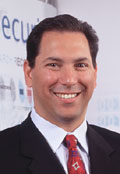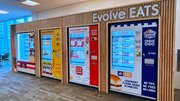News
Who's Who: David Melnik
A quiet company? It's hard to believe that David Melnik, the charismatic founder of a 15-year-old company that has kiosks operating at 120 American airports, manages to keep a low profile.
February 17, 2003
David Melnik doesn't seem like the kind of guy who would operate a "quiet" company. Nor does he have the reserved, introverted personality associated with many leaders in the technology area.
However, the founder of Kinetics Inc., a profitable 50-employee firm whose clients include seven of the top 10 airlines in the U.S., likes to call his 15-year-old firm the "most successful self-service company you've never heard of."
The 38-year-old entrepreneur, in fact, doesn't fit the profile of a technology executive at all. Before he started the company in 1988, Melnik had displayed little of the drive and ambition that marks most of his technology brethren, racking up business experience in restaurants after flailing, and ultimately failing, at academics.
His most unusual claim to fame may be that he was the first "Flipper Boy" at the Miami Sea Aquarium, a job that required him to ride the back of killer whales and insert his head into the mouths of "Orcas." He said he once aspired to a career in marine biology, so he could "sit on a boat and see what the Orcas were doing."
Today, Melnik leads a company attuned to the needs of the travel industry, and specifically the airlines that make up the bulk of his customer base. He recognizes the changing expectations of consumers.
 |
Kinetics Inc. founder David Melnik |
"It's the age of the consumer. People are used to self-service, buying tickets, pumping gas, etc.," he said. "It's a self-service culture. Airlines will become most efficient, eclipsing banks. Getting cash is not time sensitive, but when you have to check in, you have to check in.
"Self-service will continue to expand off-site, integrated into hotel and car rentals. Agents will become the advocates that guide people through self-service."
Melnik has positioned Kinetics to be a leader in providing technology to these changing consumer demands. The company claims that 30 million people used its products last year, and that it has manufactured and installed more than 2,000 kiosks operating in 120 American airports. The company provides both hardware and software for its clients, and claims its technology enables 70 percent of all self-service transactions in U.S. airports.
Fueled by Energy
Melnik is a high-energy leader who speaks to clients and employees with both confidence and urgency. And he's certainly not tied to a desk. Gene Cristan, Kinetic's director of hardware development, said Melnik is part of a group that gathers at least twice a week for a little early-morning mountain biking. Some of these sessions, Cristan said, ended for the hard-riding Melnik in bike-destroying crashes.
When clients visit his central Florida plant, Melnik has been known to make the first order of business a roller coaster ride at one of Disney's amusement parks.
Cristan said Melnik's enthusiasm is contagious. "If you watch him in a meeting, you see everybody's eyes light up and he makes them believe. He can convince people of his vision."
Chris Frawley, managing director, e-commerce for Continental Airlines, said Melnik's willing to do almost anything to prove a point to a customer - or to make sure that a thrilling memory is part of a site visit.
"I remember going to Orlando and he wants to go straight to Disney Quest (a technology-laden amusement park) or to go and ride roller coasters," Frawley said. "He likes to have a good time."
Path to Business
Melnik started Kinetics Inc. in 1988 with modest expectations. A year earlier, he had answered an employment ad posted by a travel agency, and had been calling on corporations and attempting to help them with their travel needs. It beat restaurant work, he reasoned.
He started the business that became Kinetics, naming it Kinlem (the backward spelling of his last name). He forged a partnership with NCR Corp. that opened doors for the company, which changed its name to Kinetics in 1991. In 1995, Melnik ended the NCR relationship, calling it the turning point when Kinetics became "a company on our own." In 2000, Worldspan, a global airline and travel service, bought a 25 percent interest in Kinetics.
David Melnik Born: May 11, 1964 in Miami, Fla. Education: Attended several schools, including the University of South Carolina and the University of South Florida. Has no college degree. Family: Married to high school sweetheart Cindy. Two kids, Mikayla, 7, and Taylor, 10. Career: Pursued a career in marine biology, including a stint as an animal rescue worker in Tampa, before taking a job in sales at a travel agency in 1987. One year later, he launched Kinetics. Quote: "You have to make hard decisions to make a business grow. You have to make hard decisions to understand your strengths and weaknesses. It's hard for entrepreneurs to let things go and get out of the way." |
Today, Melnik says the privately-held company is "extremely profitable," to the tune of a "six-to-seven figure" annual profit. It was not, however, an overnight success.
"I had no logical reason to be in this business," Melnik said. "I had no training. I was just a guy stupid enough to try to change the way a business is run. It's 10 years later, I can say I did."
What Melnik did was to lead the way in introducing self-service into the airline industry, starting with his first customer, Donald Trump's "Trump Shuttle" in the early 1990s.
While airline check-in technology has surged just in the last few years, Melnik's interest in the technology of self-service check-in began in the late 1980s. According to at least one customer, Melnik is a fountain of new concepts.
"David has lots of good ideas, and is a visionary," said Continental's Frawley, whose company has been a customer since 1997. "There's a level of dedication and focus in him that's rare."
Melnik said he's proud of Kinetics' customer list, which includes seven airlines, Orbitz, the online travel service, and the cruise line Royal Caribbean. He said the company will expand beyond travel-related ventures, and expects to announce a significant sports-and-entertainment related venture soon.
More to Give
Gene Cristan once came to his boss with an opportunity. Cristan's son was a member of his high school wrestling team, which was trying to raise money. Melnik wanted to help, but he also wanted to make a significant impact on the efforts of the local Habitat for Humanity organization, which was seeking volunteer labor to build a home.
Melnik agreed to give the wrestlers the money they needed, under the condition that the entire squad spend time volunteering for the Habitat project. Cristan said it's part of Melnik's unusual attention paid to employees and community service. In fact, he said, Melnik goes so far as to encourage employees to take time off off each month to work on a community service project.
 ChatGPT
ChatGPT Grok
Grok Perplexity
Perplexity Claude
Claude









